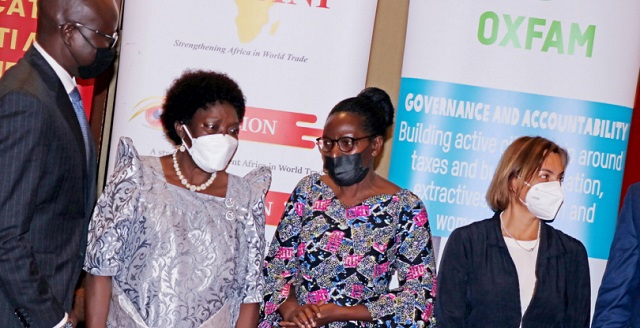
There is more of expanding markets than harmonization, experts say
Kampala, Uganda | JULIUS BUSINGE | The East African member states have been urged to tangibly manage debt and harmonise tax regimes to support growth of the East African Community.
Speaking at a dialogue, on Feb.11 held in Kampala, under the theme ‘enhancing domestic resource mobilization through tax harmonization and prudent debt management’ Esther Kisembo, from ActionAid Uganda, who presented the CSO position paper said, there is a need for ratification of key agreements such as the East African Community Double Taxation Agreement (2010), to stimulate cross-border investment movement on the labour and to among other things close loopholes that emerge with taxation on the cross-border income.
“We are calling upon East African Legislative Assembly (EALA) to conduct an analysis to ascertain why member states have not ratified the agreement,” Kisembo said.
She also urged on other issues. EALA should explore and address key tax issues surrounding the trading of sensitive commodities within the region.
There should be working systems to facilitate exchange of information between governments so as to maximize revenue collection and prevent revenue losses that could arise as result of tax avoidance and evasion.
“We are calling on EALA to conduct an analysis on the status of implementation of the MoU on the exchange of information in all the partner states,” she said.
The other issue is the slow implementation on the council directive on harmonization of tax processes and procedures to facilitate the free movement of goods, labour and services. Implementation of policies like digital stamps in all members in the East African Community should be implemented.
The other area is, harmonization of tax incentives in order to avoid harmful tax, unfair competitions.
Governments, she said, need to do cost-benefit analysis on incentives which sometimes, result in the foregoing of the much-needed revenue to finance social services. Kisembo also said EALA should persuade member countries to implement the EAC tax harmonization policy (2019) in line with the directive from the council of ministers.
Dicksons Kateshumbwa, the MP for Sheema Municipality and former commissioner for customs at Uganda Revenue Authority, sees opportunities for as long as tax harmonization and debt management are implemented.
“There is no country in EAC that has not benefited from working together,” he said, “if we open up the markets and allow goods to cross the borders, revenue laws will not be an issue.”
Kateshumbwa said, countries in the EAC are at different levels of industrialization and along the way, countries failed to agree, nation interests came in the way like Buy Uganda Build Uganda as opposed to Buy East Africa, Build East Africa.
“There is little progress because there is more of expanding markets than harmonization,” he said.
Rebecca Kadaga, the first deputy Prime Minister of Uganda and minister for East African Community Affairs, said harmonising tax regimes and managing debt will fuel growth of the community given that the market is expanding with anticipation that the Democratic Republic of Cong is soon joining.
She also said, there is political will, citing “our NRM and President Museveni” who believes in the EAC integration process to push for social economic transformation of the people.
“The role of domestic resource mobilization has become important because pursuing Sustainable Development Goals and Agenda 2030, requires resources to achieve,” she said.
Member states are struggling to meet tax revenues and failing to reach at least 15% of GDP ratio because of the challenges the trading bloc is facing.
On debt, she said, there are rising [debt] levels and costs associated with it which causes a burden on governments to achieve economic growth, puts pressure on foreign reserves and budget resources.
Kadaga tasked the EALA to look into the issues of tax harmonization and prudent debt management so as to make the EAC work much better.
Another speaker, Peninah Mbabazi, said EALA should ensure that loan contraction and approvement in various member states is done on time given that a lot of money and resources have come through the pandemic and they should be deployed to work.
“It is common to see debt growing before the returns…and projects have been completed.”
Jane Nalunga, the executive director at Southern and Eastern Africa Trade Information and Negotiations Institute, said Uganda and the EAC region needs to position better in the ever changing and dynamic global economy.
The work CSOs are doing, Nalunga said, is to assess the progress made by the EAC countries in tax harmonization and analyse the progress on complying to the public debt convergence criteria.
Available data from member states indicates that debt levels are in the red with some countries already in breach of the maximum debt thresholds agreed upon under the region’s macroeconomics convergence criteria. As of October 2020, South Sudan Debt to GDP ratio stood at 71%, Kenya was at 66%, Burundi at 65% and Rwanda 61%. Tanzania had the lowest at 38%.
For Uganda specifically, as of June 2021, its debt to GDP ratio was 47%, it is projected to rise to 51.6%, 52.4% in 2022, 2023 respectively before declining to around 50% in 2024/25, according to Ramathan Ggoobi, the permanent secretary and secretary to the treasury at Uganda’s finance ministry.
The dialogue came at an opportune time when EAC countries are devising ways to finance their budgets amidst the ongoing Covid 19 pandemic hit.
****
 The Independent Uganda: You get the Truth we Pay the Price
The Independent Uganda: You get the Truth we Pay the Price


